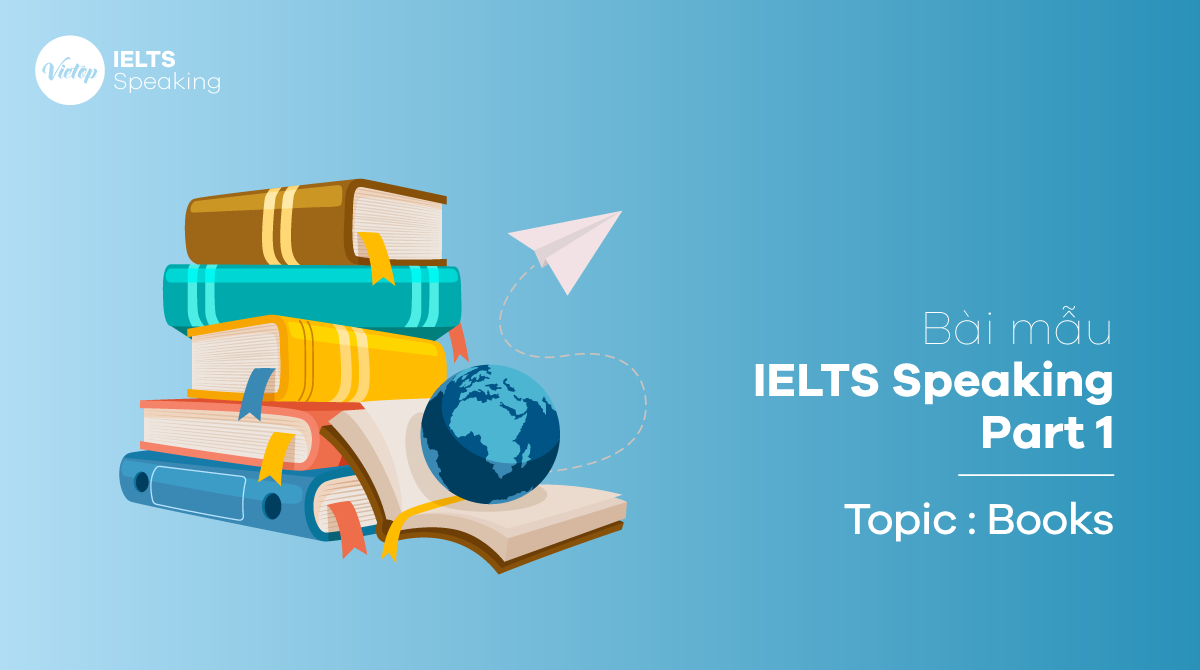Chủ đề về sách hoặc đọc sách – Books là một trong những chủ đề thú vị giúp bạn dễ dàng gây ấn tượng với giám khảo trong IELTS Speaking Part 1. Hãy cùng Vietop tham khảo ngay một số câu trả lời câu cho topic Books – IELTS Speaking Part 1 để đạt điểm cao IELTS Speaking Part 1 nhé!
1. Topic Books – IELTS Speaking part 1: Your habit of reading books

Mời mọi người nghe Audio Topic Books – Sample: Your habit of reading books tại đây nhé!
1.1. Do you have many books at home?
I love to read, thus I have completely depleted my savings on books. That is why you can easily discover a sizable book collection in my home’s book case, which is nicely arranged in the living room.
- Deplete st on…: dành hết cái gì đó cho…
- Savings (n): tiền tiết kiệm
- Sizable (adj): Kích cỡ lớn
- Arrange (v): sắp xếp
1.2. How often do you read books?
I read books every day because it has become a habit of mine. Any kind of book is a necessity in my pack whenever I travel because it can be an enjoyable activity to pass the time while waiting. Additionally, it is difficult to imagine a day without reading books before bed.
- Necessity (n): sự cần thiết
- Enjoyable (adj): thích thú
- Pass the time (v): giết thời gian
Xem thêm: Khóa học IELTS Cấp tốc – Cam kết tăng ít nhất 0.5 – 1.0 band score SAU 1 THÁNG HỌC
1.3. What kind of books do you like to read?
As a voracious reader, I have a tendency to adore any page-turner. But, to be completely honest, I continue to be a huge admirer of two genres: fantasy novels like Harry Potter and The Lord of the Rings and traditional romance novels like Pride and Prejudice. Those pieces of art really allow me to take a break from my everyday routine and develop my emotional intelligence.
- A voracious reader (n): Người ham đọc sách
- Have a tendency to do: có xu hướng làm gì
- Page-turner (n): Một cuốn sách hay
- A huge admirer (n): một fan chân thành
- Emotional (adj): thuộc về cảm xúc
1.4. Do you usually read for leisure or for work purposes?
Until I became older, I treated reading as purely a pastime. As part of my studies, I currently have a lot of reading to do. I probably devote more time to reading academic books, articles, or textbooks as a result. Even so, I still make an effort to read one of my favorite books after a long day at the office.
- Treat st/sb as st/sb: Đối xử với ai/ cái gì như là…
- A pastime (n): hành động giết thời gian
- Devote st to V-ing (v): Dành cái gì để làm gì
- Make an effort to V (v): Cố gắng làm gì
1.5. Are your reading habits now different than before?
I used to read on the spur of the moment and only when I felt like it, but now because I want to stay current in my field, I spend more time reading and organizing what to read. The disparity in my reading preferences also shows up in the genre. I used to simply enjoy reading comic books and fairy tales, but these days I prefer to read academic papers, newspapers, and self-help books.
- On the spur of the moment: Theo thời điểm
- Stay current in st: Cập nhật về
- Disparity (n): sự chênh lệch
1.6. What was your favorite type of book as a child?
Like most children, I loved comic books when I was a little girl. I can still feel the excitement I felt as I turned the vibrant pages and immersed myself in the world of my favorite comic book characters.
- Vibrant (a): sống động
- Immerse myself in something (v): đắm mình vào
1.7. Have you ever read a novel that has been adapted into a film?
Yes, there are a lot of books that I like that have been made into movies. One of those is “Harry Potter,” which was one of my favorite book series as a child. There are probably more admirers of the movies than the books because the movies were such a huge success.
- A huge success (n): sự thành công lớn
1.8. Which do you prefer, reading books or watching movies?
Well, if I had to select, I’d go with the first option. According to one’s imagination, books provide access to many additional opportunities. The characters grow to be more fearless, funny, and sympathetic. The author can clarify the thought process going on in the character’s mind. This is something that is rarely done completely in adaptations.
- Provide access to: Dẫn đến
- Fearless (adj): gan dạ
- Sympathetic (adj): đồng cảm
- Clarify (v): làm rõ
- Adaptations (n): Các tác phẩm chuyển thể
1.9. Have you lent books to others?
Sometimes, I believe. Being avid readers, my friends and I would enjoy exchanging books. I frequently give my books—mostly English-language literature—to my friends, and in return, I receive some comic books that I can read in my free time.
- Avid reader: Người ham đọc sách
- Literature (n): Văn học
1.10. Have you borrowed books from others?
Yes, of course. I have a lot of friends who are bookworms. This means that I have a practice of borrowing comic books from my pals to pass the time on my days off or just to keep up with what’s going on in the world of manga.
- Have a practice of V-ing: Có thói quen làm gì
- Pals (n): bạn bè
- Manga (n): truyện tranh
Xem thêm:
- Bài mẫu Topic Handwriting – IELTS Speaking Part 1
- Bài mẫu Topic Business – IELTS Speaking Part 1
- Bài mẫu Topic Making Lists – IELTS Speaking part 1

Nhận tư vấn miễn phí khóa học hè
2. Sample: Children & Books
Mời mọi người nghe Audio Topic Books – Sample: Children & Books tại đây nhé!
2.1. What do you think are the benefits of reading for children?
Despite the fact that fewer kids today are interested in reading, it cannot be denied that books play such a significant part in a child’s upbringing. First of all, books are educational resources that parents can use to introduce their children to the art and culture of the outside world. Additionally, the moral precepts in every book would nourish their souls and love for people, creating a future generation that was well-rounded.
- Upbringing (n): Nuôi dưỡng
- Moral Precept (n): đạo đức
- Nourish (v): nuôi dưỡng
- Well-rounded (adj): toàn diện
2.2. What type of books do children read nowadays?
I’d think that, aside from textbooks for school, today’s youth aren’t really interested in reading books. Instead of doing other things, they would prefer to watch films featuring their favorite characters. When I think back 20 years, kids used to read cartoon stories with great excitement, but in the majority of situations, it has evaporated.
- Textbook (n): sách giáo khoa
- Evaporated (adj): biến mất
2.3. Do you think children have lost their interest in stories?
Yes, the younger generation prefers to watch videos and play games online since they are so dependent on the digital world. With animations and vocal modulations, they find them to be much more engaging than carefully reading a book.
- Dependent on (adj): phụ thuộc
- Vocal modulation (n): Sự điều chế giọng nói
- Engaging (adj): hấp dẫn
Xem thêm: Bảng chữ cái tiếng Anh
2.4. Can storybooks be an ideal gift for children?
Until they are in the primary schools, where a teacher or parent frequently tells them the stories by making reference to the illustrations in the book, in my point of view, it can be an excellent gift. However, as they mature and gain more independence, they become largely dependent on online networks, storybooks might not be the ideal option.
- Reference (n): Tài liệu tham khảo
- Illustration (n): hình minh họa
- Mature (v): trưởng thành
2.5. What can be done to encourage the habit of reading among children?
It comes to my mind that I’d suggest that parents should instill a love of reading in their children from an early age. Additionally, parents should limit their children’s time spent watching television for fun and encourage them to spend it reading books. To begin with, parents can read the storybooks to their children aloud to make it sound entertaining.
- Instill (v): Để tâm đến
- To begin with: Để bắt đầu
2.6. How much should a child read every day?
Having said that, parents ought to make reading enjoyable for their children. The greatest approach could be to allow a child to read for 30 minutes each day before going to bed.
- Approach (n): cách tiếp cận
IELTS 4.0 – Mở ra cơ hội du học. Khám phá lộ trình học chi tiết trong khóa luyện thi IELTS 4.0
3. Sample: Your opinions about Books
Mời mọi người nghe Audio Topic Books – Sample: Your opinions about Books tại đây nhé!
3.1. What is the difference between the books sold in the past and the books sold nowadays?
The vast majority of books that were written in the past were more concerned with history, the arts, culture, and religion. Modern works, on the other hand, tend to focus more on science fiction and technology. This is a significant change I noticed.
- Concerned with (adj): liên quan đến
3.2. What kind of people like reading and what kind of people don’t like reading very much?
That is a fascinating question, to be sure. It seems to make sense that older readers or those in their middle years find books fascinating and beneficial for teaching them about life. Teenagers, however, are frequently drawn to other forms of pleasure rather than reading.
- Fascinating (adj): thú vị
- It seems to make sense that: Có thể hiểu rằng
- Be drawn to (adj): bị thu hút bởi
Xem thêm: Tổng hợp bài mẫu IELTS Speaking part 2
Hy vọng rằng qua topic Books – IELTS Speaking Part 1 này, các bạn học tiếng Anh nói chung và học IELTS nói riêng sẽ có được góc nhìn tổng quan nhất về chủ đề Books – IELTS Speaking Part 1. Chúc các bạn học tốt kỹ năng IELTS Speaking!











